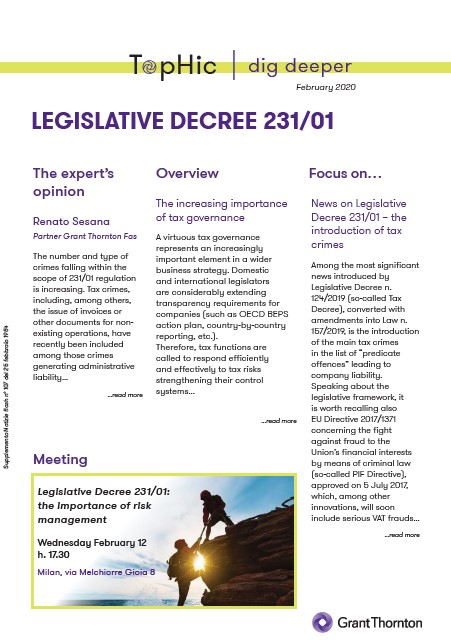-
Transactional advisory services
Find out more about the transactional advisory services of Grant Thornton Financial Advisory Services
-
Valuations
Find out more about the valuations services of Grant Thornton Financial Advisory Services
-
Mergers and acquisitions
Find out more about the merger and acquisition services of Grant Thornton Financial Advisory Services
-
Forensic and investigation services
Find out more about the forensic and investigation services of Grant Thornton Financial Advisory Services
-
Recovery & reorganisation
Find out more about the Recovery & reorganisation services of Grant Thornton Financial Advisory Services
-
Business risk services
Find out more about the business risk services of Grant Thornton Financial Advisory Services
-
Business consulting
Find out more about the business consulting services of Grant Thornton Financial Advisory Services
-
Capital market
Capital market
-
Corporate and business tax
Find out more about our corporate and business tax services.
-
Direct international tax
Find out more about our direct international tax services.
-
Global mobility services
Find out more about our global mobility services.
-
Indirect international tax
Find out more about our indirect international tax services.
-
Transfer pricing
Find out more about our transfer pricing services.
-
Litigation
Our lawyers and accountants can manage all defense measures provided not only by the Italian law, but also by EU regulations and conventions
-
Family business
Find out more about our Family business services.
-
Legal
The client can be assisted in every need and with the same care both on important operations or disputes and on simple matters

-
Back office outsourcing
Find out more about our Back office outsourcing services
-
Business process outsourcing
Find out more about our business process outsourcing services.
-
Compilation of financial statements
Find out more about our compilation of financial statements services.
-
Tax compliance
Find out more about our tax compliance services.
-
Electronic invoicing
Find out more about our electronic invoicing services
-
Electronic storage
Electronic storage is an archiving procedure that guarantees the legal validity of a digitally stored electronic document
-
Revaluation of corporate assets
Find out your civil and fiscal revaluation of tangible, intangible and financial assets
-
Human resources consulting
Find out more about our human resources consulting services.
-
Payroll
Find out more about our payroll services.
-
HR News
HR News the monthly information newsletter by Grant Thornton HR
-
Cybersecurity
GT Digital helps clients structure information security management internal functions, also through partially or totally outsourced functions
-
Agile and Programme Management
GT Digital provides support in the adoption and implementation of different portfolio management
-
Robotic Process Automation
Our “BOT Farm” can rely on digital workers able to help clients in routine activities, allowing employees to deal with more added-value activities
-
Data strategy and management
GT Digital can support clients in seizing the opportunities offered by Big Data, from the definition of strategies to the implementation of systems
-
Enterprise Resource Planning
We support clients in selecting the most appropriate ERP System according to their specific needs, helping them also understand licensing models
-
IT strategy
GT Digital supports clients in making strategic choices, identifying innovation opportunities, comparing themselves with competitors
-
IT service management
We can support with software selection and with the implementation of dedicated tools for the management of ICT processes
-
DORA and NIS 2
The entry into force of the DORA Regulation and NIS2 represents a major step towards the creation of a harmonised regulatory framework
The introduction of tax crimes
Among the most significant news introduced by Legislative Decree n. 124/2019 (so-called Tax Decree), converted with amendments into Law n. 157/2019, is the introduction of the main tax crimes in the list of “predicate offences” leading to company liability.
Speaking about the legislative framework, it is worth recalling also EU Directive 2017/1371 concerning the fight against fraud to the Union’s financial interests by means of criminal law (so-called PIF Directive), approved on 5 July 2017.
Among other innovations, it will soon include serious VAT frauds among predicate offences leading to legal entities liability, where the serious nature of a criminal offence is defined by the PIF Directive itself basing on: (i) the cross-border nature of the criminal offence (“connected with the territory of two or more Member States”) and (ii) the high amount of the damage (“a total damage of at least Euro 10 million”).
Having to include criminal tax crimes among the predicate offences, in order to enact the PIF Directive, Italy issued a European Delegation Law (Law n. 117 dated 4 October 2019) entrusting the Government with the transposition of the abovementioned EU Directive 2017/1371.
Specifically, the Government was entrusted with the task of “integrating the provisions of Legislative Decree 2001 n. 231, regulating the administrative liability of legal persons, companies and associations, including those not having legal personality, expressly providing for the administrative liability for criminal offences of legal persons, also for crimes against the Union’s financial interests not yet included among the provisions of the abovementioned decree”.
In addition to administrative sanctions, the Government was called upon to implement also disqualifying penalties provided for under art. 9 of the PIF Directive, which include the exclusion from entitlement to public benefits or aid, the temporary or permanent disqualification from the practice of commercial activities, the placing under judicial supervision, the temporary closure of establishments which have been used for committing the criminal offence.
The introduction of tax crimes - or, more specifically, the failure to include them - among predicate offences covered by Legislative Decree 231/2001 in the past, was doubtlessly one of the most controversial and discussed issues concerning the administrative liability of legal entities. On this topic, two opposite currents of thought emerged:
- the first one, contrary to the inclusion above, maintained that: (i) the inclusion would lead to a significantly higher burden of sanctions for the legal entity, since the application of the provisions of Legislative Decree 231/2001 would imply the imposition of an additional type of sanctions, against the same offences, further to the one already provided under Legislative Decree 472/1997; (ii) in any case, part of the provisions of Legislative Decree 231/2001 should be considered as inapplicable to taxation, since the delegation of functions - which represents the core of the administrative liability of legal entities - would be excluded by the fact that tax obligations are personal;
- the second one, favourable to the inclusion, underlined that in the Italian legal system there is no reason impeding the introduction of sanctioning schemes proving criminal liability, administrative liability and administrative liability depending on the offence, with the relevant penalties. From another point of view, again according to this second current of thought, not even the personal nature of the tax obligation would represent an impediment to the introduction of tax crimes among predicate offences under Legislative Decree 231/2001: actually the regulatory framework of Legislative Decree 231/2001 does not provide for a system of delegations, but only a system aimed at avoiding the commission of predicate offences.
The extension of the administrative liability of legal entities for those tax offences better specified below ended the dispute above.
The explanatory memorandum to art.39 of Law Decree 124/2019, converted with amendments into Law n.157/2019 actually explains that: “with the introduction of the administrative liability of legal entities for significant tax offences committed in the interest or for the benefit of the latter, a legal void has been filled relating to the protection of the interests of the Revenue Office which can no longer be justified both in the light of the recent EU regulations and due to the distortions and uncertainties that this regulatory gap contributed to generate”.
In particular, art.39, para.2 of the Tax Decree, converted with amendments into Law n.157/2019, introduces art.25-quinquiesdecies into Legislative Decree 231/2001, thus broadening the list of predicate offences for the administrative liability of legal entities. The original version of the Tax Decree provided for the introduction into Legislative Decree 231/2001 only of the offence of fraudulent declaration through the use of invoices or other receipts for nonexistent operations, but this list was further integrated during the examination by the Chamber of Deputies - and finally confirmed by the conversion Law - by providing the following administrative sanctions for legal entities:

Penalties increased by one third are provided in case the entity has gained a relevant profit following the tax crime.
Occurring the conditions under art. 13 of Legislative Decree no. 231/2001,i.e.: (i) if the entity obtained a relevant profit from the crime and the crime was committed by persons with management roles or by persons subject to other persons’ management if, in this case, the crime was determined or favoured by serious organisational lacks, or (ii) in case of reiterated crimes –, the following additional interdictory sanctions apply:
- prohibition to negotiate with public administrations, except for requesting a public service;
- exclusion of the application of facilities, loans, contributions or allowances and revocation of any facilities, loans, contributions or allowances already obtained;
- prohibition to advertise goods and services. It is pointed out that EU directive 2017/1371 on the fight against fraud to the Union's financial interests by means of criminal law – implemented in the Italian law under art. 3 of the recent implementing act “Legge di delegazione europea 2018” – requires Member states to provide liability for legal persons which obtained a profit from the commission of crimes that prejudice EU financial interests, should such crimes be committed by people with a management role, or following omitted controls by company executives.
As regards the effective period of the new regulation, art. 39, para. 3 of the Tax Decree, turned with amendments into Law no. 157/2019, identifies a different effective period compared to that indicated in the Law Decree under art. 60, basing on which the decree came into force the day after the publication in the official gazette: the provisions, in fact, apply only starting from the publication in the official gazette of the Law Decree conversion law on 24.12.2019.
Lastly, it must be highlighted that the above-described regulatory evolution requires companies, now more than ever, to analyse all their tax risks related to their activities, and implement organisation and control models aimed at preventing tax crimes. In practice, companies must prove to have rules and procedures to manage tax returns and tax payments, procedures for the preparation and constant review of budgets, reporting procedures, control of irregularity indicators.
In fact, the legal person is not liable for the crime only if it can prove that, before the crime was committed, it adopted proper organisation measures aimed at preventing the perpetration of crimes by its executive bodies (if the crime is committed by people with management roles), as well a proper monitoring and organization system in order to control the person responsible for the crime (in case the crime was committed by a person subject to the management of others).

